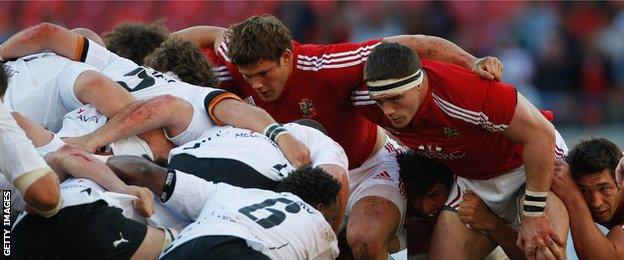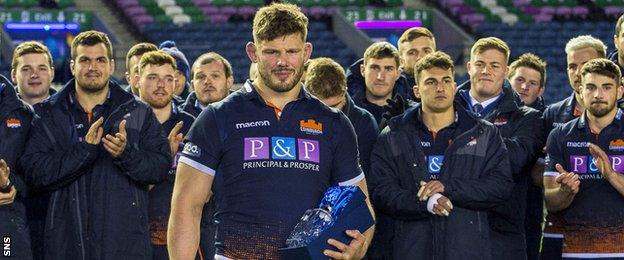Ross Ford: Record-breaking Scotland career tinged with what might have been
- Published
Watch: Ford scores two tries against Italy
To look at him that day in summer 2017, you wouldn't have thought for one second that Ross Ford, cool as a breeze, was about to rewrite the Scottish rugby record books once more.
Three years earlier, he had bypassed Gordon Bulloch to become his country's most capped hooker of all time. A year later, he overtook Scott Murray to become Scotland's most capped forward. And now, in the heat of Fiji, he was to usurp Chris Paterson to become the nation's most capped player with 110 Tests to his name.
Ford was talking before the game against Fiji - which was duly lost - and was calmer than the waters of Draunimbota Bay behind him. That was the way of it with Ford, though. From his first cap in 2004 to his last - that very game in Fiji in 2017 - his demeanour was of a man who was so laidback he was in danger of falling over.
That was the persona he gave off, but nobody can win as many caps as Ford won without being driven to some extent. He kept it all under wraps, but the professionalism of the guy was exemplary, the love he had for being involved in rugby was obvious even though he didn't shout it - or even whisper it - from the rooftops.
Following on from being released by Edinburgh, his home for nearly 200 games, his retirement from rugby was expected, but it calls for retrospection.
At his very best, Ford was a powerhouse of a player, a man who had the physical capacity to impose his will on events. Former British & Irish Lions and Scotland coach Jim Telfer used to say that if Ford punched his considerable weight on the field then not many hookers would be able to live with him.
That was a regular refrain in the Ford years. The criticism he endured pretty much throughout his career was that he didn't bring that hard edge to the table nearly often enough. That might seem an odd thing to say given his record caps haul and his call-up for the Lions in South Africa in 2009, when he won a Test cap off the bench in the victorious third and final Test, but there's truth in it.
'His drive was an example to all'

Ross Ford (centre) was on the Lions tour to South Africa in 2009
In his pomp, Ford had as his contemporaries Matthew Rees and Richard Hibbard of Wales, Jerry Flannery and Rory Best of Ireland, and Dylan Hartley and Tom Youngs of England. In raw talent terms, he was ahead of some of them. In terms of consistent belligerence and manic intensity, he was behind most.
The oft-repeated line about his career is that it could have been so much better had he possessed the same amount of nasty as some of the other hookers in his era. It's hard to argue with that.
There are other layers to the story, though. Ford played 110 times for Scotland. Of the 110, 55 of them were in the Six Nations. Of the 55 in the Six Nations, only 13 ended in victory. Those numbers present a glimpse of the flipside. Ford was playing in a Scotland team that spent many years in a competitive fog.
His resilience off the field in times of heavy strife was outstanding. His determination to keep driving on no matter how bad things got was an example to all.
He arrived into professional rugby when nearly all around him in Scotland was doom and gloom. His first professional club, Border Reivers, were shut down. At the time, and for some time afterwards, his employers at Murrayfield were a debt-laden, blazer-heavy, suspicious, disorganised shambles.
His first international coach was Matt Williams, who brought with him a nice haircut, a bright set of teeth and some killer patter but not a lot else. Williams inherited a failing team and managed to make it worse with his daft notions and his monstrously over-inflated sense of his own talent. It was Ford's lifelong privilege to play for his country, but it was hard. At times, brutally hard.
'Mental resolve among some slapstick'

Ross Ford played 197 times for Edinburgh
After winning his first cap, Ford had to wait 15 months to win a second and two and a half years to win one from the start. Williams had an 18% win percentage in his time in the job. In his wake, Frank Hadden won 39% of his Tests, Andy Robinson won 43%, Scott Johnson won 31%.
There were some big wins, for sure. Ford played on Scotland teams that beat England, Ireland, Wales and France in the Six Nations and Australia, South Africa and Argentina in summer tours and autumn internationals. The wins were just too infrequent, though. Occasionally, Scotland threatened to become something only to fall in a heap.
There was some amount of losses and some amount of slapstick in those years and some amount of mental resolve was required to plough through them. Ford practically owned the Scotland No.2 jersey from the spring of 2007 to the spring of 2016. Occasionally, he owned it as captain. He was a senior player on a ship that was being buffeted constantly.
He never gave a sense of it being a difficult existence, but the poundings not just by opponents but by supporters and media can't have been easy. For years, he tried manfully to make a bad situation better. Towards the end, he got to see some brighter days with Vern Cotter and Gregor Townsend.
He left the international scene on a low in Fiji, but he more than anybody else, could put that low into context. The weekend before that defeat, Scotland beat Australia in Sydney playing the type of rugby that they were incapable of playing for much of Ford's years in the team. When he said afterwards that he knew things were picking up, he spoke from a position of hard-earned knowledge.
At 35, the playing days are now over, but the mentoring days are far from at an end. Scottish Rugby made a good call in keeping Ford in the professional loop as a strength and conditioning coach within the national academy. There's a lot of wisdom in that head of his, a lot of experience that would have been awful to waste.
